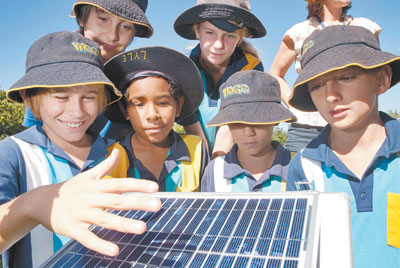Spotlight on sustainability

|
For the past three years, Cairns Regional Council (CRC) has focused on embedding quadruple bottom line sustainability into everything it does. This considers the environment, the community, the local economy and the regional culture. Caring for the environment is one of CRC’s key corporate goals. Council is progressive and innovative in its approach to improving operational sustainability while reducing its impact on the environment and considering the risks of climate change.
As a member of ICLEI Oceania (Local Governments for Sustainability), and an official Reef Guardian Council, CRC proactively addresses climate change through ongoing efforts to monitor and reduce greenhouse gas emissions.
Reducing carbon emissions
A carbon emissions reduction policy guides these efforts, as Council works to achieve carbon neutrality and a 50 per cent emissions reduction on 2007–2008 levels by 2020. CRC’s Climate Change Strategy 2010–2015 directs efforts to address climate change and peak oil vulnerability in the Cairns region. The Strategy will see CRC using more renewable energy and adopting sustainable design guidelines for Council buildings.
A sustainable transport plan is being developed and a grant program initiated to support community projects that promote sustainability and enhance community resilience to climate change or peak oil.
Installation of renewable energy systems on Council buildings delivers on a commitment made under the Climate Change Strategy. The first two 2kW grid connected solar energy systems were installed at Mossman and Gordonvale Libraries in 2008 and are saving more than three tonnes of greenhouse gas emissions per year. A further six grid connected solar systems, totalling 50kW, have been installed this year at the Babinda Library, Gordonvale Community Hall and four of CRC’s wastewater treatment plants.
“The systems were installed as part of our Greenhouse Gas Mitigation Action Plan and Climate Change Strategy,” Council’s General Manager Planning and Environment, Peter Tabulo said. “Not only are we seeing the benefits of lower electricity bills and reduced emissions, the solar systems are also proving to be a powerful tool for community engagement and education. It shows the public that Council is putting its money where its mouth is.”
Water savings
Under CRC’s Developing Sustainable Communities Water Saving Target project, water saving devices and waterless urinals have been installed in a number of Council administration buildings and public amenities, achieving water savings of more than 2200KL per year.
Reducing water consumption in this way also cuts energy consumption and greenhouse gas emissions – by reducing demand for water treatment and pumping – and the community further benefits through reduced operational costs.
CRC has also installed the first of three all in one filtered water drinking fountain and bottle refill stations on the Esplanade with aim to reduce the use of ‘one-off’ disposable water bottles.
Branded with Council’s sustainability message ‘Reduce, Reuse, Recycle’, the water stations provide filtered water, each unit has specific attachments to allow refilling of water bottles.
“The idea of these drinking stations is to encourage people to reuse rather than dispose of plastic water bottles,” Peter Tabulo said.”We want to limit the 300 million plastic bottles that are deposited in landfill, waterways and oceans every single year.”
Earth Hour
Since 2008, CRC has joined corporate and government partners to participate in and promote the worldwide Earth Hour campaign. In 2010, the region’s 15 per cent electricity reduction target was achieved (a five per cent increase from the 2009 target), saving about 15 tonnes of greenhouse gases – the same impact as taking 25,000 unleaded fuelled cars off the road for one hour.
Green Smart
Green Smart is a new CRC program providing staff with direction, education and awareness to act in a more sustainable manner.
“We’re aiming to reduce the environmental and economic impact associated with our daily operations by focusing on smart use of paper, energy, waste and resources,” said Peter Tabulo. “We are now purchasing 100 per cent recycled copy paper and aim to continue to reduce paper consumption, to ease the environmental and economic impact associated with our paper use.”
Sustainability Scorecard
CRC has developed a Sustainability Scorecard to measure and report on its sustainability performance, and to help embed sustainability considerations across all activities and operations.
The Sustainability Scorecard is a first for Local Government, with no equivalent framework currently available in Australia.
Built around the quadruple bottom line approach, the Scorecard focuses on improving resource efficiency, conserving biodiversity, enhancing community health and wellbeing, and delivering sound governance and economic management.
“By using the Sustainability Assessment tool in all Council Reports and procurement decisions, we are seeing the benefits of improved decision making and project planning which takes into account the holistic consideration of sustainability,” Peter Tabulo said.








